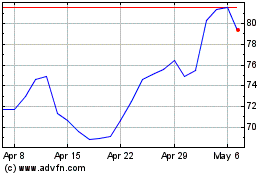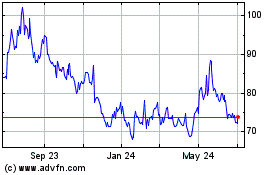By Paul Page
Sign up:With one click, get this newsletter delivered to your
inbox.
South Korea's Daewoo Shipbuilding & Marine Engineering Co.
is at a crossroads as the troubled shipyard tries to survive in a
changed and much smaller market for new ships. The company unveiled
a new $2.6 billion bailout package that would provide badly needed
cash, the WSJ's In-Soo Nam reports. The shipbuilder's biggest state
creditors, Korea Development Bank and the Export-Import Bank of
Korea, are providing funds to improve Daewoo's cash flow and
convert its liabilities into equity to cut debt, alongside Daewoo's
third bailout in the past four years. The crisis extends the pain
in South Korea's shipping industry, a critical piece of the
country's export-focused economy, following last year's collapse of
container-shipping giant Hanjin Shipping Co. Daewoo is being
dragged down by similar forces -- excess capacity on the water has
eroded demand for new ships, raising the need for more state
support.
Top U.S. auto makers believe the best place to start rethinking
trade policy is on car lots in China. The automobile companies are
pressing the Trump administration turn its trade focus toward
automobile sales in China and take a harder line over hefty tariffs
that provide a big advantage to Chinese companies, the WSJ's Trefor
Moss, Chester Dawson and William Mauldin report. The auto makers
are facing big changes in North American trade policies, including
President Donald Trump's demands to boost U.S. manufacturing, that
could drive up their production costs. But Mr. Trump also wants to
level the playing field on trade with China, where the car
companies want a bigger slice of the country's big automobile
market. Beijing sees its auto industry as a strategic asset,
however. And although Chinese companies have been investing in auto
production in the West, they see little chance of gaining a
significant foothold in U.S. sales.
Sears Holdings Corp. is sending a stark message to investors --
and to suppliers. The company raised doubts in a securities filing
about its ability to keep operating after seven years of losses,
the WSJ's Anne Steele reports, putting new clouds over the iconic
business in a retail market in upheaval. Sears insists the company
remains viable, but the fresh concerns rattled businesses tied to
the retailer: Shares in retail real-estate investment trusts
slumped as shopping-center landlords around the U.S. started
weighing their exposure over a possible bankruptcy filing. The
company has already sold off a large swath of real-estate holdings
to generate cash, but Sears is still struggling as consumers leave
department stores for online retailers. The shakeout is hitting
harder as the impact of a tough holiday season for brick-and-mortar
operators takes hold: retailers including Bebe Stores Inc., Payless
Shoes, Nine West and J.Crew are the latest in a growing field of
storefront operators facing tough choices over closing stores or
entering bankruptcy.
TRANSPORTATION
An avian influenza outbreak that may be the worst in seven years
is upending the poultry industry in Asia. The human death toll in
China is rising and chickens are being culled across Asia, the
WSJ's Lucy Craymer reports, weighing on prices in China and leaving
other markets to rely on imports from countries such as the U.S. to
ease domestic-supply shortages. Market watchers say bird-flu has
often created volatile swings in the global poultry industry, and
that markets have been hit this year as outbreaks have hit in
China, South Korea and on a Tennessee chicken farm. While China
banned U.S. chicken outright in 2015 over avian-flu concerns, other
importers, such as Thailand, could benefit. The U.S. Department of
Agriculture estimates that China's chicken imports will rise nearly
10% for all of 2017. If that happens, China would become the
world's second-biggest poultry importer behind Mexico.
The troubled demise of trucker Jevic Transportation will have an
impact across the world of bankruptcy law. The U.S. Supreme Court
handed the company's former truck drivers a victory, the WSJ's Peg
Brickley reports, rejecting the tactic known as structured
dismissal that put some creditors ahead of drivers for payment
claims. A lawyer for the drivers, who were left in the lurch when
the company simply locked its doors one morning in 2008 and stopped
operating, says the decision affirms their claim. But the drivers
won't get paid anytime soon -- it simply sends the case back to
bankruptcy court for what will likely mean more costly legal work.
The ruling will be felt across other bankruptcy cases, however, by
showing that companies can't take a back door through chapter 11 to
set their own priorities for who's paid and who's left behind.
QUOTABLE
IN OTHER NEWS
Sales of previously owned U.S. homes fell 3.7% in February amid
rising prices and tight inventory. (WSJ)
Brazil is racing to convince concerned markets that meatpackers
accused of bribing inspectors did so to get their products out
faster, not to sell rancid meat. (WSJ)
Future orders for Nike Inc. are down 4% as the retailer faces
growing competition and discounting from online sportswear sales.
(WSJ)
China's Zhejiang Geely Holding Group Co., withdrew its planned
bid for a controlling stake in Malaysian auto maker Proton Holdings
Bhd. (WSJ)
General Electric Co. promised to cut another $1 billion in costs
from its industrial operations after discussions with an activist
investor. (WSJ)
A U.S. officials says negotiations for a big trans-Atlantic
trade deal are still alive. (Agence France-Presse)
Women's apparel retailer Bebe Stores Inc. is closing all its
stores to focus entirely on e-commerce sales. (WSJ)
Wal-Mart Stores Inc. will start construction of a Mobile, Ala.,
distribution center the retailer will use to manage imports coming
through the Port of Mobile. (Birmingham News)
Starbucks Corp. plans to open 12,000 stores by 2021, including
3,400 new sites in the U.S. (MarketWatch)
Federal transport regulators are dropping a new rule heavily
opposed by the trucking industry that would change how carrier
safety fitness is determined. (Commercial Carrier Journal)
Maersk Line says there is enough container ship capacity to
support 3% annual trade growth for the next five years. (Journal of
Commerce)
Kerry Logistics Ltd. is selling its stake in a Hong Kong air
freight terminal in part to build reserves for its acquisitions
strategy. (The Loadstar)
Chinese airline STO Express, a supplier to Alibaba Group Holding
Ltd., is starting freighter flights between Hong Kong and Italy.
(Lloyd's Loading List)
Greece's Thessaloniki port is expecting four bids this week for
a majority stake in the country's No. 2 ocean gateway. (Splash
24/7)
The number of Americans killed on railroad tracks rose sharply
last year. (Progressive Railroading)
ABOUT US
Paul Page is deputy editor of WSJ Logistics Report. Follow him
at @PaulPage, and follow the entire WSJ Logistics Report team:
@brianjbaskin, @jensmithWSJ and @EEPhillips_WSJ and follow the WSJ
Logistics Report on Twitter at @WSJLogistics.
Subscribe to this email newsletter by clicking here:
http://on.wsj.com/Logisticsnewsletter .
Write to Paul Page at paul.page@wsj.com
(END) Dow Jones Newswires
March 23, 2017 06:56 ET (10:56 GMT)
Copyright (c) 2017 Dow Jones & Company, Inc.
Alibaba (NYSE:BABA)
Historical Stock Chart
From Aug 2024 to Sep 2024

Alibaba (NYSE:BABA)
Historical Stock Chart
From Sep 2023 to Sep 2024
